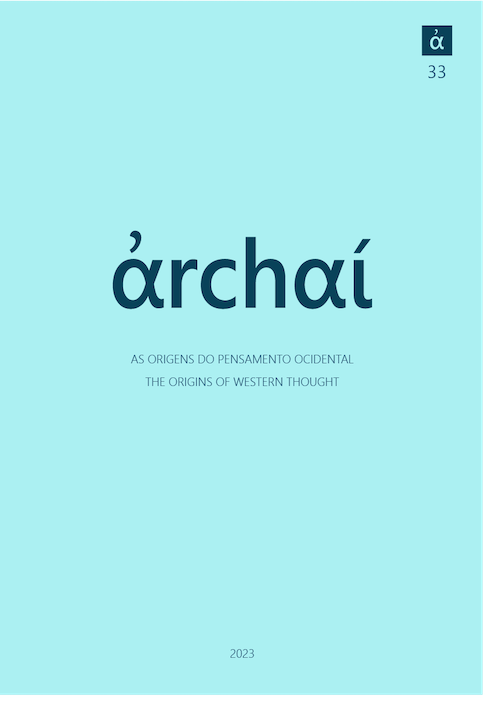Thought, Memory, and Being in Plato’s Sophist
DOI:
https://doi.org/10.14195/1984-249X_33_23Palavras-chave:
Plato, thinking, lógos, memory, recollectionResumo
Thinking as described in Plato’s Sophist undergoes two basic changes: it progresses by shifting from one to many and it regresses by shifting from many to one. The change from one to many is generative; the change from many to one is reductive. These opposing changes provide a tension for thinking, and like Heraclitus’ bow string, this tension gives thinking its efficacy. Thinking would wander and accumulate endlessly unless it regresses from many to one. Yet, thinking would stagnate if it could not progress from one to many. Both changes are essential characteristics of thinking, and both rest on memory. Memory constitutes the foundation of thought.
Downloads
Referências
AMBUEL, D. (2007). Image and Paradigm in Plato’s Sophist Las Vegas, Parmenides Publishing.
BEEKES, R. (2010). Etymological Dictionary of Greek Leiden, Brill.
COOPER, J. (ed.) (1997). Plato. Complete Works Cambridge, Hackett Publishing Company.
CORNFORD, F. M. (1935). Plato’s Theory of Knowledge New York, Harcourt, Brace and Company.
FOWLER, H. N. (trans.) (1921) Plato. Plato in Twelve Volumes, Vol. 12 Cambridge, Harvard University Press
GUTHRIE, W. K. C. (1978). A History of Greek Philosophy: Vol. V: The Later Plato and the Academy Cambridge, Cambridge University Press.
IONESCU, C. (2013). Dialectic in Plato’s Sophist: Division and the Communion of Kinds. Arethusa 46, n. 1, p. 41-64.
KAHN, C. H. (1981). The Art and Thought of Heraclitus: An Edition of the Fragments with Translation and Commentary Cambridge, Cambridge University Press .
KAHN, C. H. (2007). Why Is the Sophist a Sequel to the Theaetetus? Phronesis 52, n. 1, p. 33-57.
LIDDELL, H. G.; SCOTT, R.; JONES, H. S. (1968). A Greek-English Lexicon Oxford, Clarendon Press.
MINAR, E. L. Jr. (1939). The Logos of Heraclitus. Classical Philology 34, n. 4, p. 323-341.
MOST, G. W. (ed. and trans.) (2006). Hesiod. Theogony, Works and Days, Testimonia Cambridge, Mass., Harvard University Press.
PENDER, E. E. (1999). Plato’s Moving ‘Logos’. Proceedings of the Cambridge Philological Society 45, p. 75-107.
Downloads
Publicado
Como Citar
Edição
Seção
Licença
Copyright (c) 2023 Anthony Pasqualoni

Este trabalho está licenciado sob uma licença Creative Commons Attribution 4.0 International License.
Dado o acesso público desta revista, os textos são de uso gratuito, com obrigatoriedade de reconhecimento da autoria original e da publicação inicial nesta revista. O conteúdo das publicações é de total e exclusiva responsabilidade dos autores.
1. Os autores autorizam a publicação do artigo na revista.
2. Os autores garantem que a contribuição é original, responsabilizando-se inteiramente por seu conteúdo em caso de eventual impugnação por parte de terceiros.
3. Os autores garantem que a contribuição que não está em processo de avaliação em outras revistas.
4. Os autores mantêm os direitos autorais e concedem à revista o direito de primeira publicação, sendo o trabalho licenciado sob a Creative Commons Attribution License-BY.
5. Os autores têm permissão e são estimulados a publicar e distribuir seu trabalho on-line após a publicação na revista.
6. Os autores dos trabalhos aprovados autorizam a revista a, após a publicação, ceder seu conteúdo para reprodução em indexadores de conteúdo, bibliotecas virtuais e similares.
7. É reservado aos editores o direito de proceder ajustes textuais e de adequação do artigo às normas da publicação.



